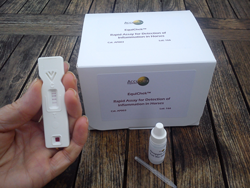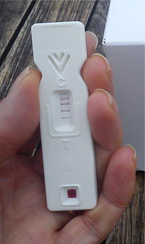 Serum Amyloid A in Horses
Serum Amyloid A in Horses
The use of Serum Amyloid A (SAA) to aid diagnosis of equine conditions is well documented 1,2,3. However, the need for investment in laboratory equipment and the time taken to gain results have restricted the use of SAA for the ambulatory practitioner.
Fibrinogen vs Serum Amyloid
Many vets still use fibrinogen as a way of assessing a horse’s inflammatory condition. They certainly get a number, but what does this number actually mean and how reliable is this number. The real issue, what value does Fibrinogen bring to assessing inflammatory conditions in horses and should the vet be looking for more reliable tests.
 Fibrinogen has long been the traditional marker of inflammation in horses and has been used either alone or in conjunction with white blood cells. However in recent years Serum Amyloid A (SAA) has started to gain traction as an alternative indicator of inflammation and with good reason. A quick look at the figure to the right demonstrates why.
Fibrinogen has long been the traditional marker of inflammation in horses and has been used either alone or in conjunction with white blood cells. However in recent years Serum Amyloid A (SAA) has started to gain traction as an alternative indicator of inflammation and with good reason. A quick look at the figure to the right demonstrates why.
Serum Amyloid A
Serum Amyloid A (SAA) is a major acute phase protein of inflammation in horses. Very low levels are seen in normal healthy conditions but it increases within hours of a problem to levels 100-1000 fold above normal. The rise in SAA during an inflammatory response is much clearer. SAA increases are high and rapid. Many clinical and subclinical conditions will In contrast, fibrinogen is a minor acute phase protein in horses, with reference levels in most labs ranging between 100-4004 or 200-400 mg/dl4,5 and only rising 0.5-2 fold above normal. The increase in SAA is substantially higher, and hence more reliable. A recent publication³ concluded that the relatively wide reference interval for fibrinogen concentrations in healthy horses and a lengthy response period after an inflammatory stimulus, has rendered fibrinogen a fairly insensitive indicator of inflammation. Hence, a horse with an active inflammatory condition can have an increase in fibrinogen but still be within the normal range given the small increases that occur.
A recent study1 by an equine lab in Miami, in 212 horses, demonstrated a clinically significant and very distinct increase in SAA for horses with active inflammatory conditions. Importantly, SAA alone indicated several horses with subclinical conditions and these horses all developed clinical symptoms in following days, neither fibrinogen, nor white blood cells were raised. The overall conclusion was that Serum Amyloid A is the most reliable and the most accurate indicator of an active inflammatory condition.
The Road to Recovery
Monitoring recovery requires knowing when to administer and when to cease administration of therapeutics. With inflammation, it is essential to know when the horse has recovered to avoid unnecessary use of therapeutics. With fibrinogen the levels remain elevated well after the resolution of a problem, as long as two weeks after the horse has returned to normal. A very significant advantage of SAA is the rapid fall in levels to normality following successful intervention7,8, giving a clear signal of recovery.

EquiChek™
Inflammation Detection Made Simple
 EquiChek™ SAA Test
EquiChek™ SAA TestThe test is simple to use with results in less than 10 minutes. A semi-quantitative visual readout indicates whether the horse has normal, moderate or clinically significant inflammation.
- Confirming the presence of an active inflammatory condition in the field or at the stable
- Detection of sub – clinical inflammation where there is a suspicion something is wrong
- Real time monitoring of recovery of disease activity
- Real time monitoring following therapeutic intervention
- Detection of sub-clinical inflammation due to trauma as result of over training
- Monitoring health status before an event to assess the horses ability/potential to perform at peak level.
- Checking pregnant mares at late stage of gestation for plancentitis
- Check inflammatory status prior to commencing treatment with Autologous Conditioned Serum (EC-ACS)
- Assessing horse health prior to or after transportation
- An indicator to prompt for more detailed diagnostic testing EquiChek™ uses a novel competitive assay format to detect SAA in whole blood. The test delivers a semi-quantitative visual readout to help distinguish between normal and mild to clinically significant inflammation. The test is based on competition between SAA present in a sample and SAA printed onto the test strip with antibody coated gold nanoparticles. Unlike other tests EquiChek™ is not affected by the high dose hook effect.

For additional information about EquiChek™ or its application, please contact Moira McCracken, Director of Veterinary Sales, at (800) 752-8538 or via email. [Click Here]
| EquiChek: Stall-side Test for Horses |
|---|
| Place Order |
